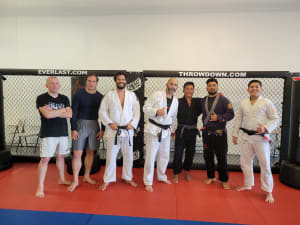
Why Brazilian Jiu Jitsu as a Great Choice for Self-defense
Brazilian Jiu-Jitsu is specifically designed for competitors, making it the single most extraordinary grappling art for competitive grappling. Original BJJ techniques were chosen for a grappling-specific competition-based fighting style. Brazilian Jiu-Jitsu has repeatedly shown itself to be one of the most outstanding and most effective martial arts ever created, if not THE best. This started with Royce Gracie defeating opponents in the Early UFC wear he was always the smaller man but undefeated in bascally no rules fighting. And for the Martial Arts historians Brazilian Jiu Jitsu effectiveness started even before this with the Gracie family proving it effectiveness in Street fights, Dojo challenges and Pro fight in Japan.
Brazilian Jiu-Jitsu focuses on obtaining a dominant position through leverage and good technique, followed by a submission from a self-defense aspect. A boxer or a standup fighter seeks a knockout, yet knockouts are challenging to anticipate. Some people can withstand huge headshots and keep moving. A well-applied choke, on the other hand, will put even the most powerful, aggressive person to sleep, putting them under pressure, which is the aim. Immobilize the person, then devise a plan to keep yourself safe. There's no need to exhaust yourself attempting to land a knockout blow. Apply a choke/submission to your position, reserving your energy for the trek to safety.
No serious MMA fighter, much alone a cop, military, or private security guard, can even get very far without learning BJJ. The ability to learn to control a person when on the ground by using your own weight, leverage and technique make it a necessity for being effective in a physical altercation in any circumstances.
Brazilian Jiu-Jitsu critics frequently claim that it is ineffective against numerous assailants. So, which style is right for you? If you're up against several attackers, no matter what type you use, you're in considerable danger, and I can guarantee that if the battle goes to the ground, those who don't know how to defend on the ground will be in much worse trouble.
Sure, try to stay on your feet for as long as possible, but you can't promise that you'll be able to do so for the duration of the fight. You could trip over something, lose your equilibrium, or do something else. Then, if you don't have any grappling abilities, you're doomed.
Any standup fighter is aware of their flaws, and one of those flaws is on the ground. As a result, take action. Learn how to grapple. Learn how to fight in a clinch. Learn how to fight on the ground.
Returning to the initial question, "What makes BJJ so effective?"
When comparing Brazilian Jiu-Jitsu to Judo and Japanese Traditional Ju-Jitsu, the methods are nearly comparable. Same throws, chokes, grips, and so on...just different names. Leverage, off-balancing (Kuzushi), and other concepts are all the same.
The main distinction is Brazilian Jiu-Jitsu emphasis on position hierarchy. Always be aware of your position and how to go from a weaker to a stronger position, whether on defense or offense.
This idea is not taught in any other combat art.
Take this technique and apply it to your standup and clinch fighting, and you will become a powerful opponent.
The ground game is highly useful in both BJJ and Judo for self-defense. The majority of battles end up on the ground, and dominating your opponent is crucial to victory. It's advantageous to be able to terminate a battle by choking your enemy unconscious or dislocating an arm, shoulder, or wrist. This training can assist you in surviving being on the ground beneath an unexpected assailant. You can end players from the bottom, but you can also sweep them up and finish your opponent from the top.
It may sound strange, but if someone tries to hit you while you're on the ground, you'll have opportunities to employ the tactics described above.



